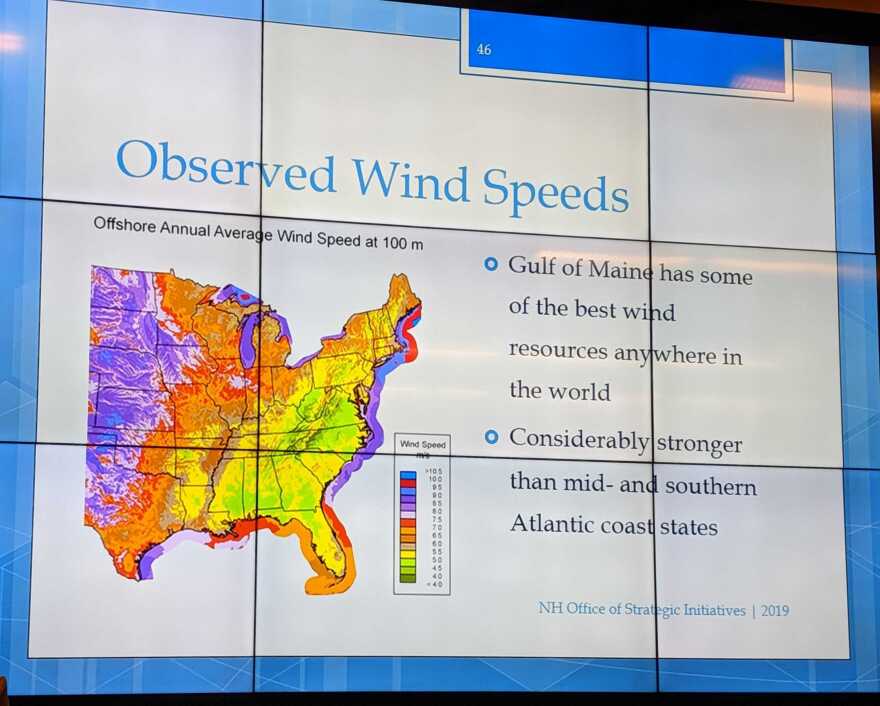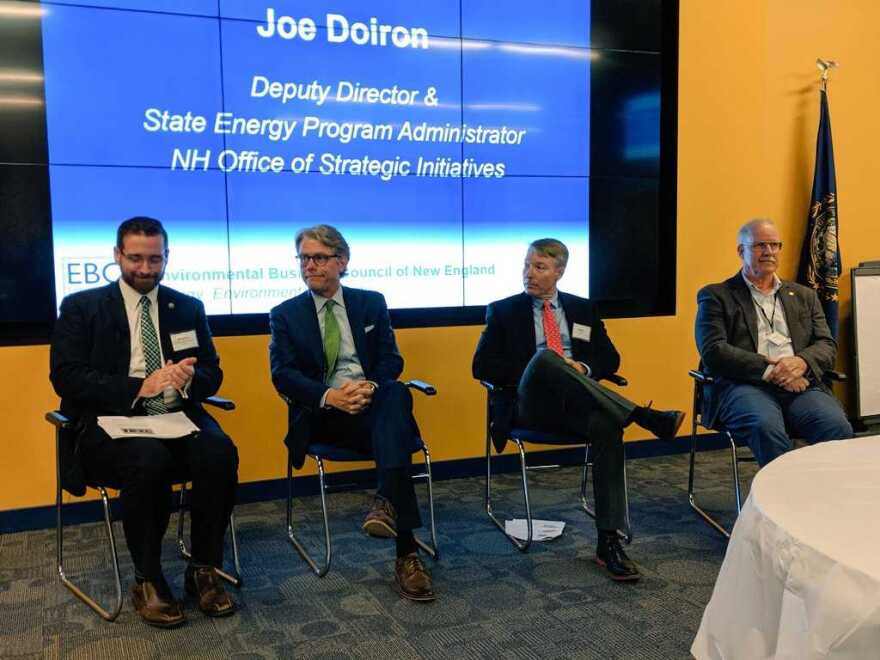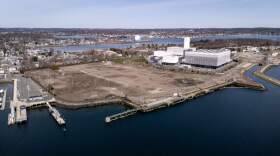New Hampshire, Maine and Massachusetts will work together on large-scale offshore wind development in the Gulf of Maine. Stakeholders from the three states met today in Manchester talk about the possibilities and obstacles for that new industry.
The event was hosted by the Environmental Business Council of New England at the state headquarters of Eversource, which is developing several large offshore wind projects elsewhere in the Northeast.
Taylor Caswell, commissioner of the state’s Department of Business and Economic Affairs, said at the meeting that he thinks Northern New England could add tens of thousands of jobs building these offshore turbine farms, and the transmission infrastructure to bring their power on-shore.
“This is not just a project. This is not just an individual, ‘we’re going to find a site and put a couple of turbines up,’” Caswell says. “This is the establishment of, really, a whole new industry.”
The Bureau of Ocean Energy Management plans to hold the first meeting of a three-state task force on the issue in mid-December. The New England group is the third regionalized wind group BOEM has formed, after ones in the New York area and the Carolinas.

The group's first job would be to help choose specific areas for offshore wind leasing in the federal waters of the Gulf of Maine – likely at least 30 miles out to sea.
From New Hampshire state government, the task force will likely include Caswell, state energy program administrator Joe Doiron, marine fisheries chief Doug Grout, and watershed management bureau administrator Ted Diers.
It will also include Maine and Massachusetts officials, plus federal, local and tribal government representatives. Once the group begins its work, officials say turbine development in federal Gulf of Maine waters could happen within the next decade.
The area is thought to have one of the best potential wind resources in the world.
Onshore opportunities
Stakeholders say the best way to utilize that resource will likely be floating turbine platforms, anchored to the sea floor in deep water. Many of the installations’ huge components will be too big to travel over roads and will have to be made on the adjacent coast.
“It’s a real large-size industry,” says BOEM’s Daryl François. He says it requires high-tech installation vessels, large cranes, lots of steel and storage space, and turbine blades that could be longer than a football field.
Turbines and related infrastructure construction also poses risks for fisheries, marine science, habitat and wildlife. These have been big obstacles for wind developments in southern New England.
Bill White headed up wind development for the state of Massachusetts before becoming North American executive director for German wind developer EnBW. He says New Hampshire and its neighbors should aim to put up a unified front on the challenges ahead.
“If there’s a way, a proper way, for the states to reach consensus on these issues – particularly on siting, which areas are the priorities and which should be avoided – that would go a huge way toward accelerating [the process],” White says.
New Hampshire officials emphasized that they hope to collaborate, not compete, with their neighbor states on developing and supplying wind components.

Asked how the state is working to ensure its “piece of that pie,” Caswell said officials are analyzing the expected needs of an offshore wind industry, and “trying to build an ecosystem” to bring it here, based on the state’s existing tech and aerospace sectors.
Eversource offshore wind vice president Ken Bowes says if the Granite State plays its cards right, it could wind up making major contributions to the many gigawatts of wind energy currently in the works across the East Coast, as well as to future projects.
"You have some natural abilities here with the seaport in Portsmouth, also with a tax structure that's very beneficial to manufacturing,” Bowes says. “So you do have an opportunity here that you should probably think about seizing on in the short-term."
Political uncertainty for state energy procurements
He and others say a key way to accomplish that would be for New Hampshire to set up a large-scale energy procurement program to agree to buy some of the wind power generated.

It could be similar to long-term energy contracts approved by lawmakers in southern New England states, under policies aiming to bring more renewable energy into the region.
Earlier this year, Republican Gov. Chris Sununu blocked a Democratic-led bill that proposed a study commission on renewable energy procurements. That bill was sponsored by state Senate Majority Leader Dan Feltes, who is now running for governor.
Sununu said in his veto message that creating the commission "would open the door to increased [energy] costs for decades to come.”
But Caswell and others in Sununu’s administration now say they think offshore wind development will be a cost-effective opportunity for the state. They argue it will be cheaper for ratepayers than other renewables, in part due to its potential large scale.
“From the environmental policy perspective, we want to advance a least-cost option in a region where there’s a patchwork of aggressive greenhouse gas emissions reductions [policies],” says Joe Doiron of the state Office of Strategic Initiatives. “Offshore wind is going to be a big player, and we love this.”
Caswell says it’s too soon to make detailed plans for a procurement program.
But he says the administration wants to proceed "anticipating that we want to have this industry enter Northern New England and New Hampshire,” meaning they'll likely talk with the state legislature about issues like wind energy procurement.
State Senate Democrats, including Feltes, recently put out an energy agenda for the 2020 legislative session that emphasizes procurements and participation in regional energy issues, as well as solar power and offshore wind.
As part of that, Sen. David Watters of Dover says he hopes within the next week to propose a set of task forces to coordinate wind siting and industry development at the state level.
State-led aspects of that siting will include substations and transmission infrastructure to distribute power generated offshore. Stakeholders say they hope to build some of that on the New Hampshire Seacoast.







